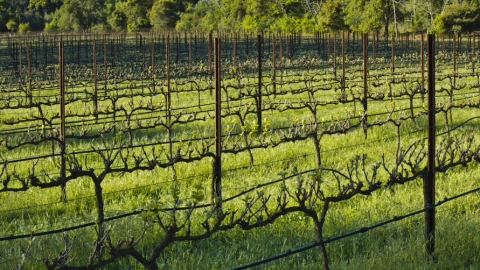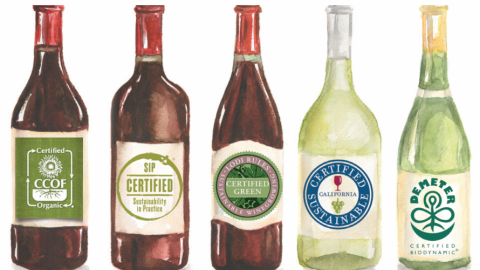Eco Winery Stars
![]()
Jon Aver is an unabashed soil geek. On any given day you’ll find him in his Santa Clara Valley vineyard spraying beneficial preparations, adding soil amendments or ushering in a sheep flock for natural fertilizer and weed control.
Aver has one simple motto: “It’s the soil, stupid,” he says. “If you have healthy soils you’ll have healthy plants, and then if you have healthy plants, you’re gonna obviously have great grapes.”
Aver Family Vineyards* and other Silicon Valley vintners are leading the way in earth-friendly and regenerative agriculture, new buzzwords in grape farming practices. For many wine drinkers, how wineries farm is now as important as the quality of the wine in the glass. Wine consumers are increasingly knowledgeable about farming practices and care about where their dollars are going. They are looking to support hand-crafted wines from small, local family-owned wineries that can show their wines’ provenance—versus mass-produced, conventionally farmed wines.
Here’s what six wineries in the Santa Cruz Mountains and Santa Clara Valley are doing to become more eco-conscious.
“We’re doing it to be good stewards of the land, the vineyards and [to help mitigate] climate change.”
– Doris Cooper, Cooper-Garrod Estate Vineyards, Saratoga
The Sustainability Originals
Consider Bill and Doris Cooper your go-to local sustainability experts.
In 2010 their Cooper-Garrod Estate Vineyards was one of the three original California wineries in a pilot program to be certified through the new California Sustainable Winegrowing Alliance (CSWA) statewide sustainability program. Bill Cooper, a fourth-generation vintner, worked with CSWA to develop a handbook that wineries of all sizes could use to voluntarily self-assess and improve sustainable practices related to farming, winemaking, the environment, energy, employees, community and economics.
“It’s easy to do,” he says. “When you start out you set a goal, make a work plan. The deal is continuous improvement.”
For example, they set a goal of monitoring water usage, and as a result cut back by cleaning barrels with steam instead. Cooper-Garrod’s vineyard and winery are CSWA-certified sustainable and the estate’s vineyards are also certified organic by the California Certified Organic Farmers (CCOF).
“We’re doing it to be good stewards of the land, the vineyards and [to help mitigate] climate change,” adds Doris Cooper.
To that end, she says their wine bottles are much lighter now, saving on transportation energy. They use cardboard shippers instead of styrofoam shippers. All corks are recycled or given away for school craft projects.
______
At San Martin’s Clos LaChance Vineyards, Bill and Brenda Murphy are sustainable grape-growing early adaptors. Their winery and vineyard was one of the first 17 in California to be CSWA-certified sustainable in 2010.
“Everything is taken into account,” says winemaker Jason Robideaux, “whether it is your community involvement, economic viability for the winery, working with your employees and creating a good work environment.”
While the winery property is 285 acres, 45 acres are untouched wildlife wetlands.The habitat is home to various raptors, egrets, turkeys, vultures, deer, ducks, reptiles and more. Native wildlife, native grasses and vegetation coexist with the grapevines. Jason says, “We carefully work the land around it to create a barrier that is distinct and gives the wildlife a sense of what is safe and not.”
“What we do here is bring a sense of place...This is it: We can’t make the wine more local.”
- Bill Cooper,Cooper-Garrod Estate Vineyards, Saratoga
The Soil Builders
Jon Aver of Aver Family Vineyards* has been diving deep into soil health since he started farming his 8.5-acre Gilroy estate vineyard in 2005. He’s learned to love weeds because their roots feed microbes that create balanced soils. Sixteen cover crop varieties (grasses, legumes, cereals) feed the soil and attract beneficial insects. He no longer tills weeds and cover crops under, keeping their roots intact to feed nutrients to those critical soil microbes.
How’s the wine? “Our scores keep getting higher and higher,” he says. “Our wine club members tell me our wine keeps getting better and better year after year.”
“Increasingly you have a more educated consumer. They’re asking about what you’re spraying, how you manage things in the vineyard, about weeds or whatnot.”
– Tom Fogarty Jr., Thomas Fogarty Winery, Los Gatos
Grape farming at Thomas Fogarty Winery and Lexington Wine Co. means tending to nearly 40 acres at the Fogarty winery in Woodside and Gist Ranch in Los Gatos.
“Increasingly you have a more educated consumer,” says vintner Tom Fogarty Jr. “They’re asking about what you’re spraying, how you manage things in the vineyard, about weeds or whatnot.” Had consumers asked 10 or even 20 years ago, they’d have learned that Fogarty wasn’t using herbicides then, and they have been focused on building vineyard soil health ever since.
When winemaker Nathan Kandler came on board in 2004, Tom Fogarty says, some of the older Chardonnay vineyards were not doing great and yields were low. They considered replanting, but Nathan asked to have a crack at it and started working on soil health. Those vineyards have come around.
“They’re in their bonus years now,” Tom says. “I believe the vineyards will last a lot longer and deliver consistently higher quality.”
Nathan points to several holistic practices, such as cover cropping with multiple varieties targeted to specific vineyard blocks, intensive composting with pomace (skins, seeds and stems left over from the winemaking process) and worm-based vermicompost tea sprays. Fogarty Winery is 100% solar, generating enough power for winery operations even on foggy days. Nathan Kandler says conserving water is also a priority. While they basically dry farm, they monitor the soil moisture, giving just enough water to keep vines healthy.
The Sheep Herders
Storrs Winery & Vineyards in Aptos is one of the 16 Santa Cruz Mountains wineries listed in the Slow Wine Guide USA 2021. Slow Wine, born out of the Slow Food movement, has a 10-point manifesto for “good, clean and fair wines.” Storrs has practiced eco-conscious farming from its beginning, in 2007, and is moving towards soil biodynamics and regenerative agriculture practices, a holistic, ecological and ethical approach to growing grapes.
“What goes into the glass after having been grown in a more eco-friendly environment has got to be—and honestly should be—better than more conventional wines,” says winemaker Pamela Bianchini-Storrs.
Where the wines are served is also delivering on the sustainability, eco-conscious mission put in place. The new Corralitos winery and tasting room, opened in 2018, was built for energy efficiency, with fiberglass rebar and soybean foam walls covered in gunite (sprayed concrete).
In 2011 Storrs brought a flock of Babydoll Southdown sheep into the vineyard. Their presence—controlling weeds and naturally fertilizing the soil—made such a difference that Storrs now has its own flock of sheep on the property. Sheep are becoming a common sight throughout Silicon Valley vineyards. Since sheep started grazing, Aver’s seen amazing vine growth—even this year, when there’s been no rain.
______
Kim and Todd Engelhardt also herd their own Babydoll sheep flock at San Martin’s Lion Ranch Vineyards & Winery, and they host hives for a local beekeeper. Every year they’re improving farming practices too. “We’re following more regenerative farming practices, like not tilling, letting a more natural ecosystem exist,” Kim says. “We’ve installed high-tech soil moisture monitoring devices to help us know the precise water needs of the vineyard.”
Making eco-conscious wines all comes back to the local factor.
“What we do here is bring a sense of place,” says Bill Cooper. “We use organic, sustainably grown grapes on our estate, with native yeasts from our venue for fermentations. This is it: We can’t make the wine more local.”
“Everything is taken into account, whether it is your community involvement, economic viability for the winery, working with employees and creating a good work environment.”
– Jason Robideaux, Clos LaChance Vineyards, San Martin
ECO-CONSCIOUS WINE STARS in this issue
Clos LaChance Vineyards
clos.com | San Martin
Cooper-Garrod Estate Vineyards
cgv.com | Saratoga
Lion Ranch Vineyards & Winery
lionranch.com | San Martin
Thomas Fogarty Winery & Lexington Wine Co.
fogartywinery.com & lexingtonwines.com | Woodside
Storrs Winery & Vineyards
storrswine.com | Aptos / Santa Cruz Mountains
Aver Family Vineyards*
averfamilyvineyards.com | Gilroy
Update: John and Carolyn Aver have decided it's time to retire from the grape growing and winemaking business. As of September 18, 2021 they will close the Aver Family Vineyards tasting room, which is located in their home's front yard. The Avers will continue the business as a virtual winery until they sell through their current wine inventory, which they estimate will take a couple of years. Both the home and the vineyard property will be listed for sale in early fall.




